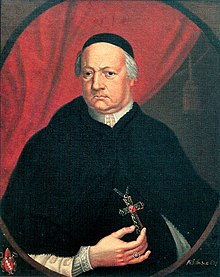Agostino Steffani

oil on canvas 89 x 69 cm by Gerhard Kappers (circa 1714)


Agostino Steffani (25 July 1654[1] – 12 February 1728[2]) was an Italian bishop, polymath, diplomat and composer.
Education
Steffani was born at
]Steffani excelled as a choirboy and was asked to sing at important occasions. Aged 11 and 12 he sang opera in Venice.
On his return to Munich with Bernabei in 1674, Steffani published his first work, Psalmodia vespertina, a part of which was reprinted in Giovanni Battista Martini's Saggio di contrappunto in 1774. In 1675, Steffani was appointed court organist.
Royal appointments
The date when he was ordained priest, with the title of abbot of Lepsing, is not precisely known. His ecclesiastical status did not prevent him from turning his attention to the stage, for which, at different periods of his life, he composed work which exercised a potent influence upon the dramatic music of the period. Of his first opera, Marco Aurelio, written for the carnival and produced at Munich in 1681, the only copy known to exist is a manuscript score preserved in the royal library at Buckingham Palace. It was followed by Solone in 1685, by Audacia e rispetto, Prerogative d'amore, and Servio Tullio in 1686, by Alarico in 1687, and by Niobe, regina di Tebe in 1688.[1]
Notwithstanding the favor shown to him by the Elector
The scores are preserved at Buckingham Palace, where, in company with five volumes of songs and three of duets, they form part of the collection brought to England by the Elector of Hanover in 1714, when ascending as King George I of Great Britain. But it was not only as a musician that Steffani distinguished himself in his new home. The elevation of Ernest Augustus to the electorate in 1692 led to difficulties, for the arrangement of which it was necessary that an ambassador should visit the various German courts, armed with a considerable amount of diplomatic power.[1]
Diplomacy
Steffani was sent on this mission in 1696, with the title of
In 1698, he was sent as ambassador to
Steffani did not accompany the elector George to England, but in 1724 the
Compositions
Steffani stands somewhat apart from contemporary Italian composers (e.g., Alessandro Scarlatti) in his mastery of instrumental forms. His compositions, including opera overtures, show a combination of Italian suavity with a logical conciseness of construction attributable to French influence.[citation needed]
Works
In popular culture
Donna Leon's contemporary thriller novel, The Jewels of Paradise (October 2012), uses Steffani's life and works as a background.[7]
References
- ^ a b c d e f Chisholm 1911, p. 869.
- ^ a b c Chisholm 1911, p. 870.
- ISBN 9780195348279.
- ISBN 9780195348279.
- ^ Briseide : dramma per musica da recitarsi alla Carte Elettorale d'Hannover per il carnevale dell' anno 1696.
- ^ Timms, Colin Ronald. The Chamber Duets of Agostino Steffani (1654-1728), with Transcriptions and Catalogue. Dissertation submitted for the degree of Doctor of Philosophy in the Faculty of Music. University of London King's College, 1976, p. 49.
- ^ "The Jewels of Paradise by Donna Leon". Kirkus Reviews. Retrieved 24 June 2013.
External sources and further reading
- Herbermann, Charles, ed. (1913). . Catholic Encyclopedia. New York: Robert Appleton Company.
- Kautz-Lach, Waltraut Anna (ed.): Agostino Steffani. Musiker, Politiker und Kirchenfürst. Schriften von ISBN 978-3-99012-491-8
- Lach, Waltraut Anna: Die Operneinakter La Lotta d'Hercole con Acheloo und Baccanali von Agostino Steffani. Wien: Hollitzer, 2019, ISBN 978-3-99012-599-1
- Riemann, Carl Wilhelm Julius Hugo (ed.). Ausgewählte Werke von A. Steffani, etc. (Zweiter (Dritter) Teil ... Herausgegeben von H. Riemann.) 1911, 12 (Denkmaeler. Denkmäler deutscher Tonkunst. ... Zwölfter Jahrgang. ii. Band. 1900, etc. ASIN B0000D28HE. Series: Denkmaeler. Denkmäler deutscher Tonkunst. Zweite Folge. Denkmäler der Tonkunst in Bayern. Elfter Jahrgang. ii. Band. Zwölfter Jahrgang. ii. Band. 1900, etc.
- Timms, Colin (2003). Polymath of the Baroque: Agostino Steffani and His Music. Oxford University Press. ISBN 0195154738.
- Scores
- Free scores by Agostino Steffani in the Choral Public Domain Library (ChoralWiki)
- Free scores by Agostino Steffani at the International Music Score Library Project (IMSLP)
- Musical Manuscripts at the Harry Ransom Center
Attribution:
- This article incorporates text from a publication now in the public domain: Chisholm, Hugh, ed. (1911). "Steffani, Agostino". Encyclopædia Britannica. Vol. 25 (11th ed.). Cambridge University Press. pp. 869–870.
